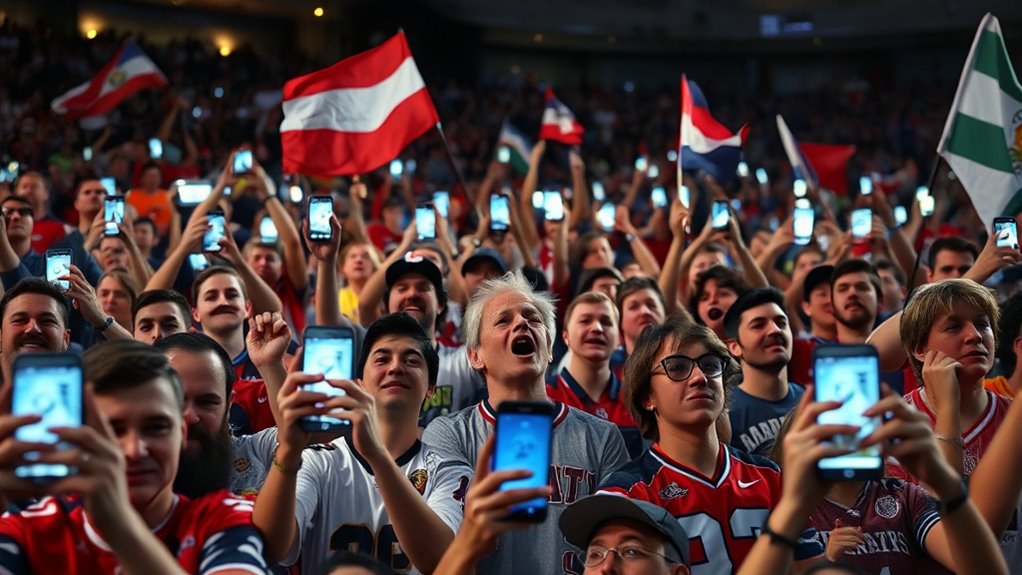During playoffs, you might hop onto popular teams driven by social identity and a desire for social acceptance. Peer pressure, group dynamics, and media narratives influence your support, often boosting emotional rewards like excitement or status. Cognitive biases, such as social proof, encourage quick loyalty shifts, while herd behavior amplifies collective energy. If you explore further, you’ll discover how these psychological factors shape your fandom choices and foster long-term loyalty or fleeting support.
Key Takeaways
- Social validation and group belonging motivate fans to support popular teams during playoffs.
- Herd behavior and peer influence drive impulsive collective actions and conformity.
- Emotional rewards, such as excitement and rituals, reinforce bandwagon support during high-stakes games.
- Media narratives and celebrity endorsements shape perceptions, fueling hype and collective enthusiasm.
- Cognitive biases like social proof and confirmation bias reinforce quick support shifts and superficial fandom.
The Role of Social Identity in Fandom Shifts
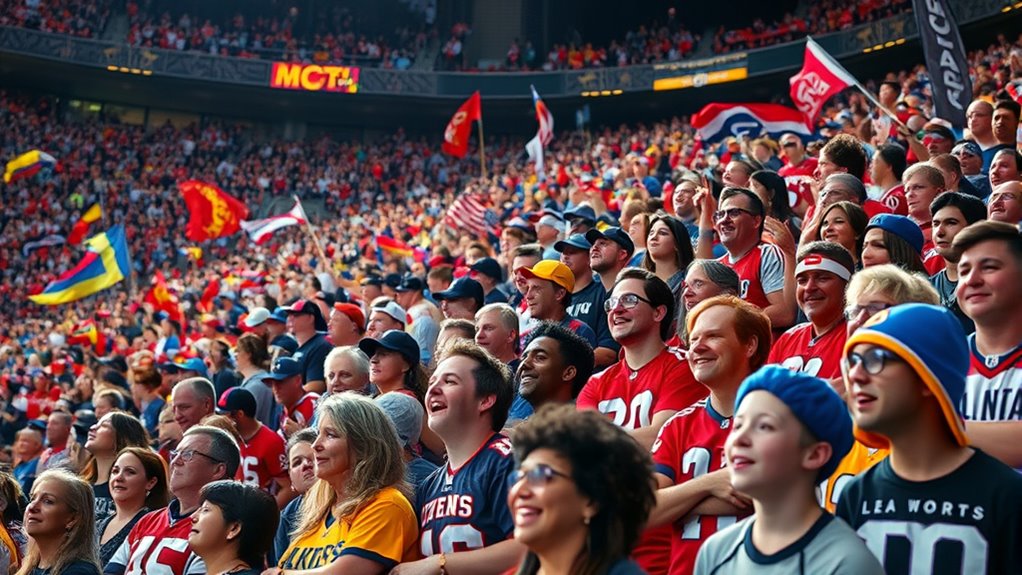
Social identity plays a crucial role in why people switch fandoms, often driven by the desire to belong to a group that aligns with their self-image. When your social identity is linked to a particular fandom, you seek validation and connection within that community. As interests change or new trends emerge, you may experience fandom shifts to better reflect who you are or want to be. These shifts are motivated by the need to enhance your sense of belonging and group membership. You might leave behind an old fandom to join one that feels more authentic or socially rewarding. Additionally, the influence of anime movies and other popular media can sway fandom preferences and contribute to these transitions. Ultimately, your social identity influences your fandom choices, guiding you toward groups that reinforce your self-perception and fulfill your social needs during fandom transitions.
The Influence of Group Dynamics and Peer Pressure
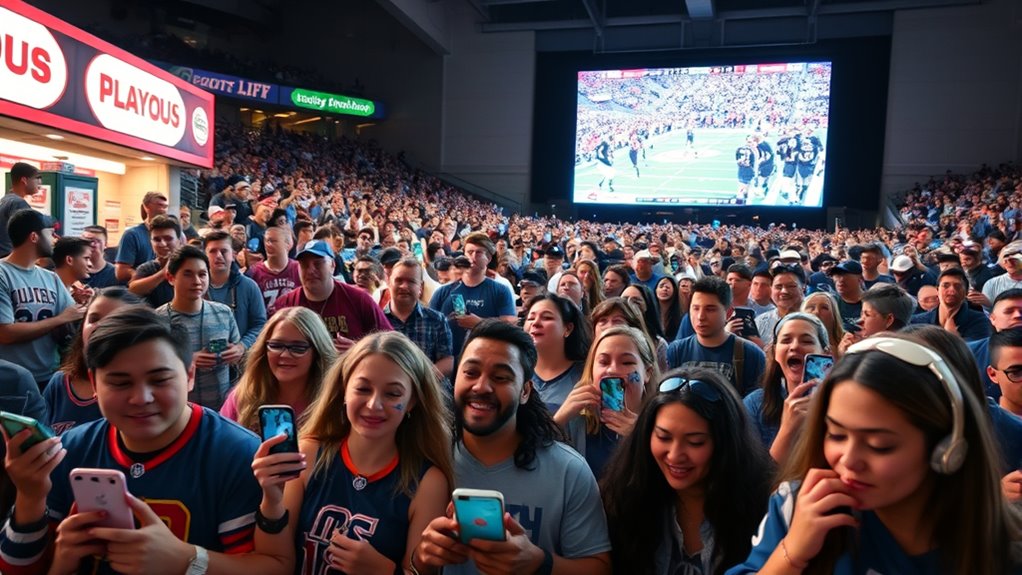
Group dynamics and peer pressure can strongly influence your decisions to hop onto a new fandom. When you’re surrounded by friends or peers who support a winning team, peer conformity makes it tempting to join in, even if you’re unsure initially. As group cohesion intensifies, you may feel pressure to align with the majority to maintain your social standing. This desire to belong often overrides personal preferences, pushing you toward the popular choice. Recognizing these influences helps you understand why you might change allegiances during playoffs. Additionally, the high refresh rates of certain projectors can make watching fast-paced sports more immersive, further encouraging group viewing experiences.
Emotional Rewards of Supporting a Winner

Supporting a winner can instantly boost your self-esteem, making you feel proud and confident. It also gives you a sense of belonging, connecting you to a larger community of fans. Plus, the excitement and joy of celebrating a victory create a thrilling experience you’ll want to repeat. Engaging with other fans during these moments can enhance your emotional rewards, strengthening your sense of connection and shared enthusiasm.
Boosts Self-Esteem Instantly
When you back a winner, your self-esteem gets an instant boost because you feel a sense of accomplishment and pride. Supporting a successful team triggers a confidence surge, making you feel more capable and optimistic. This emotional reward enhances your overall mood and reinforces your decision to support that team. Engaging in Volkswagen Tuning modifications can also provide a similar sense of achievement as you customize and improve your vehicle. These moments create a quick self-esteem boost that leaves you feeling more positive and energized. By aligning yourself with a winning team, you experience a powerful emotional reward that elevates your confidence and reinforces your connection to success.
Fosters Sense of Belonging
Celebrating a team’s victory with fellow fans amplifies your sense of belonging, making you feel part of something bigger than yourself. When you share team memories—whether it’s a thrilling comeback or a championship win—you strengthen your connection to the fan community. These moments create a sense of unity, as you and others bond over your collective support and passion. Supporting a winner reinforces that you’re part of a group working toward a common goal, fostering loyalty and camaraderie. This shared experience builds emotional ties, helping you feel included and valued within the fan base. Incorporating wall organization systems or display areas for memorabilia can further deepen your connection by showcasing your team pride prominently. In turn, these bonds deepen your attachment to the team, making your support feel more meaningful and rewarding.
Creates Excitement and Joy
Supporting a winning team often fills you with excitement and joy that can be hard to match. During playoffs, this thrill intensifies as your favorite team’s success sparks adrenaline. Engaging in playoff rituals or fan rituals heightens these feelings, creating shared moments of celebration. These rituals—wearing lucky jerseys, performing specific cheers, or gathering with friends—amplify your emotional connection. When your team wins, the rush of euphoria is undeniable, fueling your passion and pride. This joy isn’t just about the game; it’s about the collective experience. The sense of victory, combined with familiar rituals, makes supporting a winner a powerful source of happiness and excitement. Incorporating team spirit into your routine can deepen your emotional investment and enhance the overall experience. Embracing these moments keeps you engaged and emotionally invested throughout the playoffs.
Cognitive Biases That Fuel Bandwagon Behavior
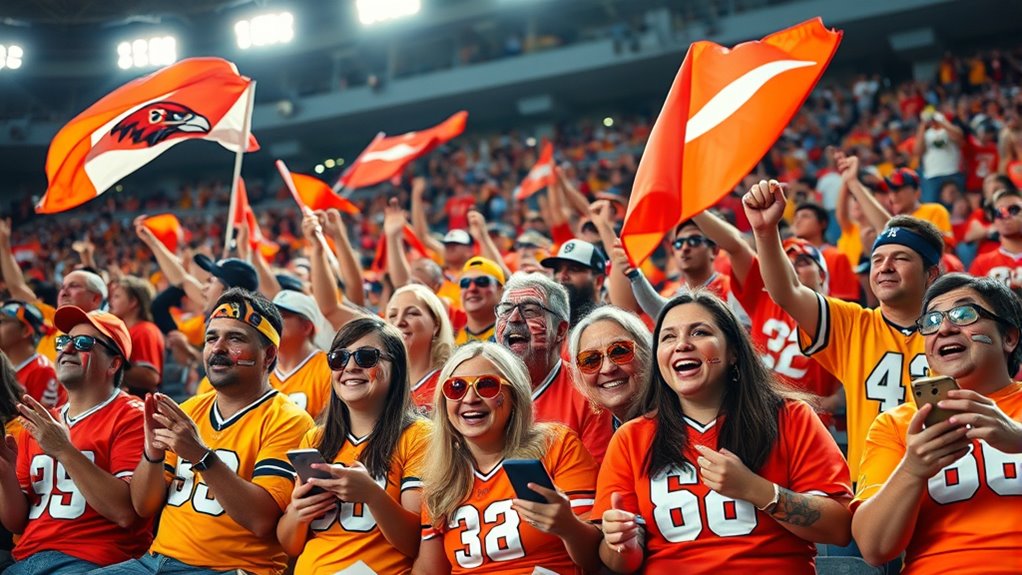
Cognitive biases play a significant role in fueling bandwagon behavior by shaping how you interpret and respond to social cues. Confirmation bias leads you to notice information that supports your desire to join the popular crowd, reinforcing your decision to hop on the bandwagon. You may overlook or dismiss signs that challenge the group’s popularity or your initial judgment. Social proof amplifies this effect; when you see others cheering for a team, you naturally assume they’re right or justified, encouraging you to follow suit. This tendency makes it easier to conform, as you rely on others’ behavior as evidence of what’s correct or acceptable. Additionally, relationship dynamics can influence emotional responses and decision-making processes within group settings. Together, these biases create a feedback loop that boosts your likelihood of jumping onto the bandwagon during playoff hype.
The Impact of Media and Sports Narratives
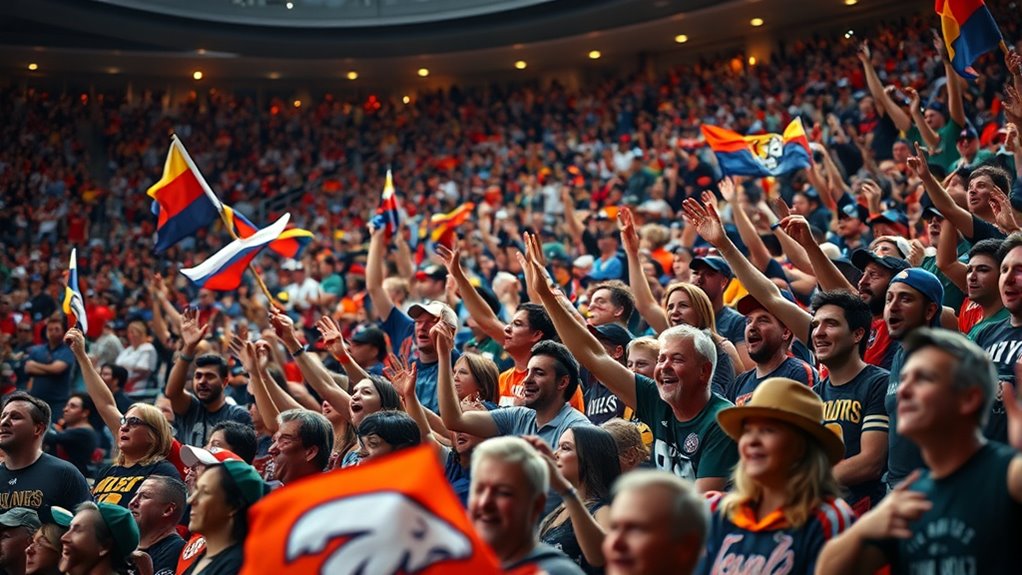
Media stories can profoundly shape your perception of teams and players, often amplifying hype or controversy. The way narratives are framed influences which teams you support and how passionately you follow them. Celebrity endorsements also sway your enthusiasm, making certain teams or athletes seem more appealing. Additionally, the mental health benefits of engaging with sports narratives can enhance your overall well-being by fostering a sense of community and emotional connection.
Media Amplification Effects
Media narratives play a powerful role in shaping public perception, often amplifying the momentum of popular sports figures and teams. This media amplification can lead to heightened excitement or pressure, influencing fans’ decisions to hop on the bandwagon. Be aware of media sensationalism, which exaggerates stories to boost ratings, and narrative manipulation that steers perceptions to favor certain teams. These tactics can create a distorted view, making it easier for fans to jump on the hype. To stay grounded, recognize how stories are spun and question the motives behind them. Media strategies such as sensational headlines heighten emotional reactions, highlighting underdog victories to rally support, repeating narratives to reinforce team popularity, and downplaying setbacks to maintain a positive image.
Narrative Framing Influence
Narrative framing shapes how stories are told and perceived, directly influencing your perception of teams and players. Media narratives often emphasize certain team qualities, fueling your sense of team loyalty or shaping opinions during rivalry dynamics. When commentators highlight a team’s underdog status or a rival’s dominance, it affects how you view each team’s chances and importance. These stories can heighten emotional investment, making you more likely to support a team during playoffs simply because of how they’re portrayed. As narratives reinforce specific perspectives, they sway your reactions and decisions, encouraging bandwagon hopping. Understanding this influence helps you recognize how media shapes your perceptions, especially when rivalry dynamics intensify and narratives become more emotionally charged.
Celebrity Endorsements Power
Have you ever wondered how celebrity endorsements can sway your loyalty to a team? Celebrity influence plays a huge role in shaping sports narratives and boosting a team’s popularity. Endorsement power isn’t just about a celebrity wearing a jersey; it’s about creating emotional connections that make you root for a team or athlete. When a famous figure backs a team, it amplifies credibility and excitement around the sport. This can lead to more fans jumping on the bandwagon, especially during playoffs. Additionally, understanding the public perception of athletes influenced by media narratives can shed light on why fans rally behind certain teams.
Personal Identity and Self-Expression Through Team Support
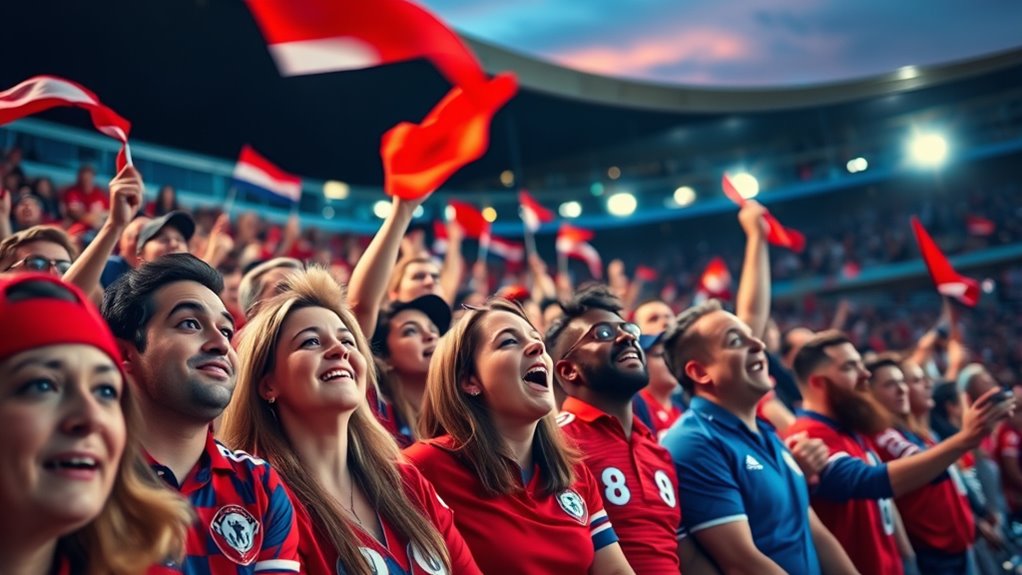
Supporting a team often becomes a way for you to express your personal identity and showcase your values. When you align with a team’s branding, you signal your interests, loyalties, and cultural affiliations. Wearing team jerseys, sharing game highlights, or displaying team colors helps communicate who you are to others. Fan authenticity matters—you want your support to feel genuine, reflecting your true connection rather than just following trends. Your choice of team support can define your social identity and help you connect with like-minded fans. It’s more than just a game; it’s a form of self-expression, allowing you to project your personality and beliefs through your allegiance. This personal connection elevates the act of supporting a team beyond entertainment into a statement of identity.
The Psychology of Herd Behavior During Playoff Frenzies
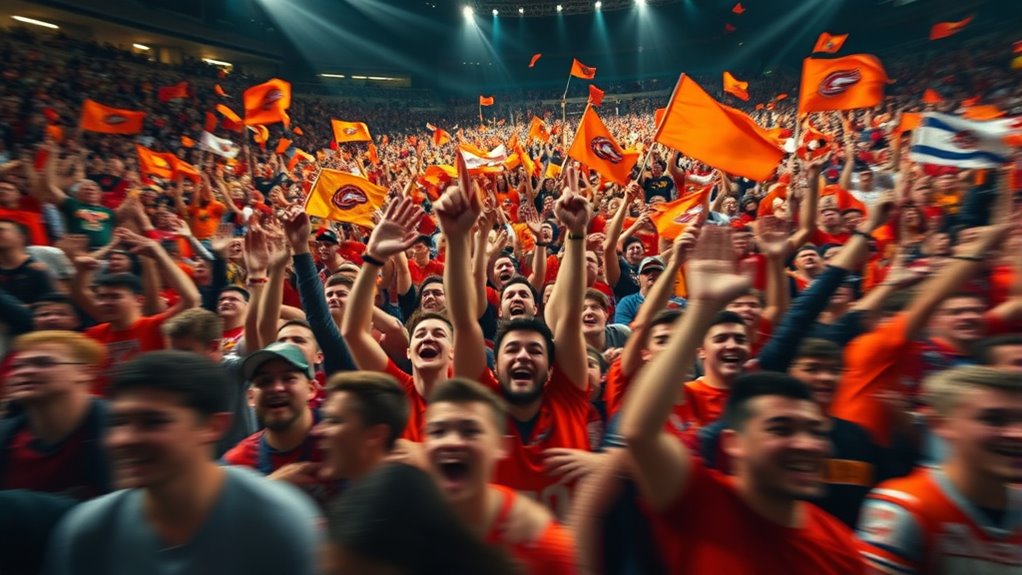
During playoff frenzies, herd behavior intensifies as large groups of fans unite in their excitement, often making impulsive decisions to join the collective cheer. Peer conformity drives you to match the energy around you, fearing social rejection if you don’t. Emotional contagion spreads quickly as feelings of euphoria or anxiety ripple through the crowd, amplifying your own emotions. You might find yourself shouting, jumping, or celebrating simply because everyone else is doing the same. This collective behavior creates a sense of unity, making individual choices feel less risky.
- You follow the crowd’s lead, even without fully understanding why
- Emotions spread rapidly, influencing your mood
- Peer pressure intensifies, pushing you toward conformity
- Collective excitement overrides personal hesitation
The Desire for Social Acceptance and Recognition
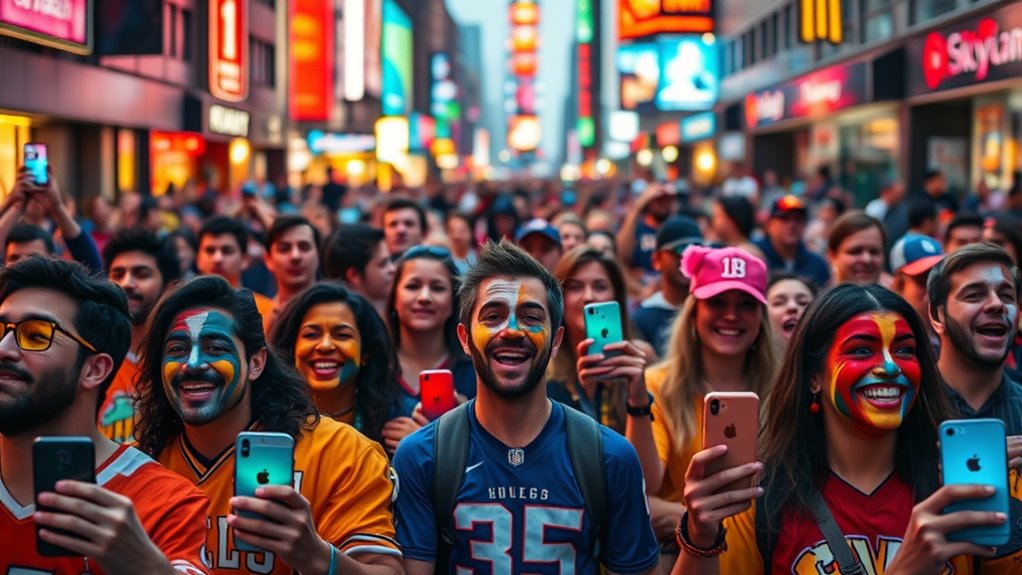
Why does the desire for social acceptance and recognition drive so many to hop on the bandwagon? It’s because peer influence and the need for social validation are powerful motivators. When you see others supporting a winning team, you may feel the urge to join in to fit in and be part of the group. This desire for approval often outweighs personal loyalty, especially during playoffs when emotions run high. By aligning with popular teams, you gain social acceptance and recognition from friends and peers. You want to be seen as someone who shares the excitement and passion, reinforcing your place within the social circle. Ultimately, this craving for validation fuels your tendency to hop on the bandwagon, even if your initial reasons differ.
Long-Term Loyalty Versus Short-Term Gains
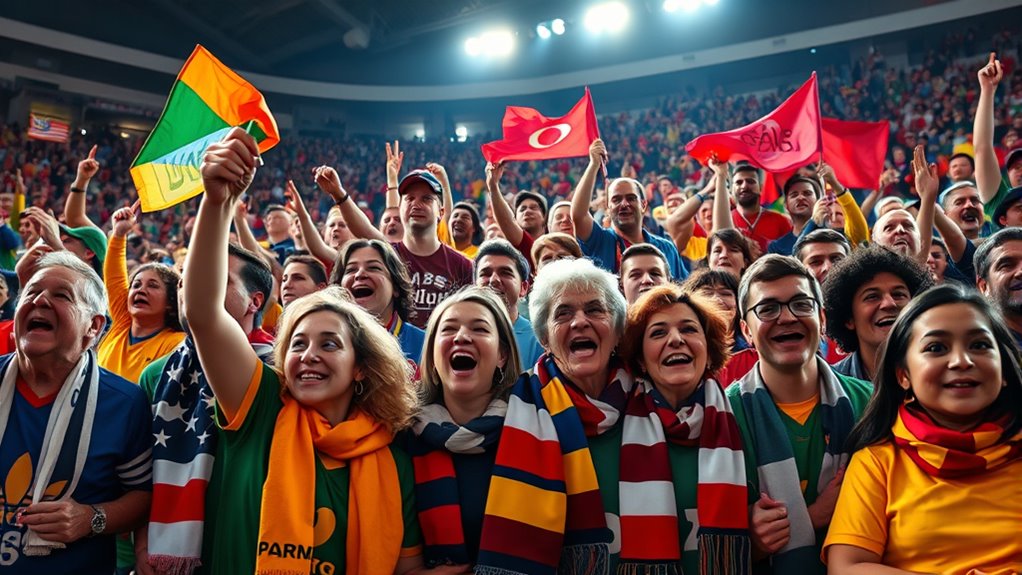
While hopping on the bandwagon can offer immediate social rewards, it often conflicts with the idea of long-term loyalty to a team or cause. True loyalty involves emotional investment and a deep connection rooted in historical loyalty, which can’t be easily replaced by fleeting interests. Short-term gains might give you instant recognition, but they risk eroding genuine passion and support.
Consider these points:
- Long-term loyalty builds a sense of identity and belonging
- Emotional investment deepens your connection to the team
- Bandwagon hopping can lead to superficial support
- Authenticity pays off when true fans stand by their team through ups and downs
Balancing short-term excitement with sustained loyalty helps preserve the integrity of your fandom and personal integrity.
Frequently Asked Questions
How Do Economic Factors Influence Bandwagon Hopping During Playoffs?
Economic factors like ticket prices and team performance greatly influence your decision to hop on a bandwagon during playoffs. When ticket prices are high, you might wait to see if the team’s performance improves before buying. Conversely, if the team performs well, more people are willing to pay premium prices, increasing bandwagon support. Economic incentives and perceived success drive your willingness to join the crowd, especially during exciting playoff runs.
Can Personality Traits Predict a Person’s Likelihood to Switch Teams?
You might wonder if personality traits can predict your likelihood to switch teams. Your traits, like openness or extraversion, influence your fandom loyalty and how you respond to team success or failure. If you’re more adaptable and social, you may be more prone to bandwagon hopping during playoffs. Conversely, if you’re highly loyal and committed, you’re less likely to switch allegiances, regardless of how exciting the playoffs become.
What Role Does Cultural Background Play in Fandom Shifts?
Your cultural background influences your fandom shifts by shaping your cultural identity and sense of community. If your cultural identity aligns with a team, you’re more likely to stay loyal, but if other teams become more relevant or exciting, your fan loyalty might shift. Cultural values and traditions also impact your willingness to support certain teams, making your fandom choices deeply rooted in your cultural context.
How Does Online Social Media Amplify Bandwagon Behavior?
You can’t ignore how social media turns bandwagon behavior into an unstoppable tidal wave. It amplifies viral trends, making everyone feel like they’re part of the biggest thing happening right now. Social validation becomes a gold medal, pushing you to hop on the bandwagon faster than ever before. With each share and like, the urge to join the crowd grows stronger, transforming casual fans into full-blown followers in seconds.
Are There Psychological Differences Between Casual and Die-Hard Fans?
You’ll notice that casual fans often lack deep emotional attachment and strong fan loyalty, making it easier for them to hop on the bandwagon. Die-hard fans, however, have a stronger psychological bond with their team, driven by emotional attachment and long-term commitment. These differences influence how each group reacts to wins and losses, with die-hard fans showing more resilience and loyalty, whereas casual fans may shift allegiances more readily.
Conclusion
As you chase the thrill of supporting a winning team, remember it’s easy to forget that true loyalty is rooted in genuine passion. While bandwagon hopping offers quick excitement, lasting connections come from authentic ties to your team. The rush of social acceptance contrasts with the quiet pride of long-term loyalty. In the end, choosing sincerity over fleeting fame defines your true fandom—whether during playoffs or in everyday life.
